Office of Research & Development |
 |

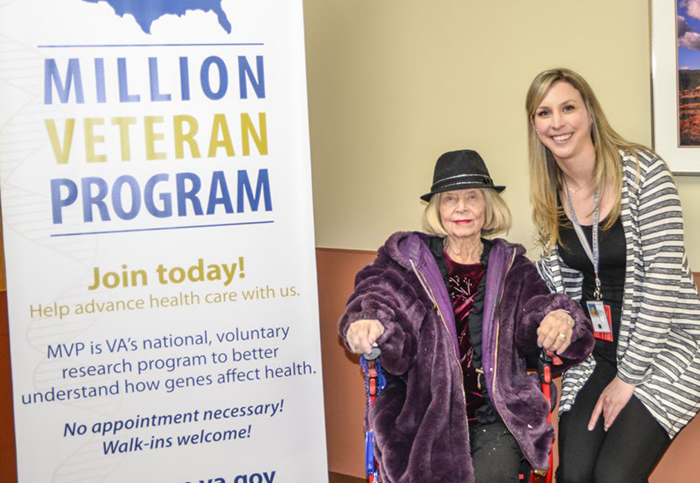
World War II Veteran and current MVP participant Rosalie Liotta poses with Kaitlyn Nelsen, MVP research coordinator at the New Mexico VA Health Care System. (Photo courtesy of New Mexico VA)
June 11, 2020
Mike Richman
VA Research Communications
"MVP is fabulous. I really appreciate what VA is doing for all of our Veterans."
Rosalie Liotta and her caregiver, Cathy Adkins, are both Veterans. Liotta enlisted in WAVES, the women’s branch of the U.S. Naval Reserve, during World War II. Adkins served in the U.S. Air Force from 1980 to 1995. In one of her assignments, she worked as an aerospace ground equipment maintenance technician during the Persian Gulf War.
That’s not the only commonality between the two. They’re both enrolled in VA’s Million Veteran Program (MVP), which is aimed at learning how genes, lifestyle, and military exposures affect the health of former service members. The two are proud to participate in the program because, just like when they were in the military, they feel they’re making a sincere effort to give back to their country.
“MVP is fabulous,” Adkins says. “I’m very excited about it and glad that VA is allowing me to participate. I really appreciate what VA is doing for all of our Veterans.”
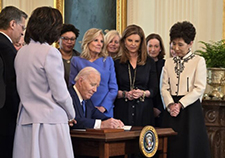
Executive Order for Women’s Health built on VA research
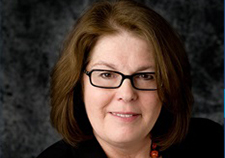
VA Researcher Named One of U.S.’ Top Female Scientists
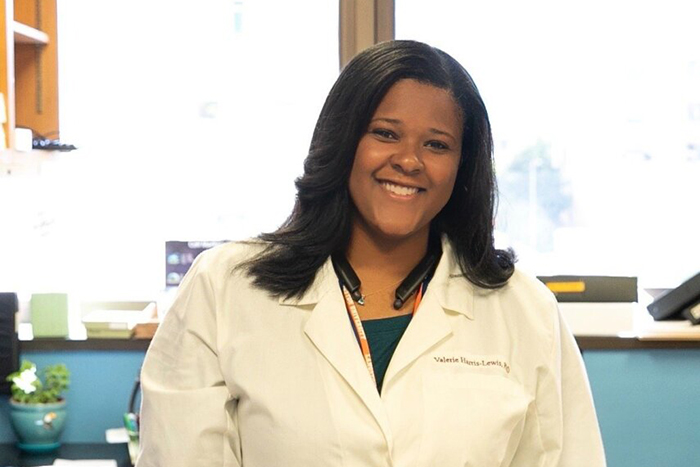
VA investigator brings diversity into autoimmune disease research
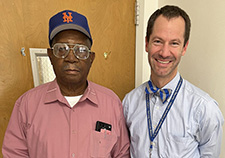
Veterans help find new cancer treatments
Women Veterans Day, June 12, is an appropriate time to recognize the contributions of female Veterans like Liotta and Adkins in the Million Veteran Program. More than 830,000 former service members are enrolled in MVP, of which 80,000 are women. Their genetic information and other health data are being used to study diseases, such as breast cancer, and to research gender differences in other common conditions, including depression and heart disease. The goal is to provide better, more personalized ways of identifying and treating diseases based upon a person’s characteristics.
Historically, women have been underrepresented in medical and biological research, leading to knowledge gaps that can result in misdiagnoses and drugs that may affect men and women differently. Although these trends have been changing in recent years, the status of women as minorities in the Veteran population can make it harder for VA researchers to recruit enough women to get valid study results. Thus, by volunteering for MVP, female Vets can make a big difference for other Veterans of today and the future.
Since MVP Online was launched nearly a year ago, the number of female Veterans joining the Million Veteran Program has increased because of the ease of enrolling online. This marks an important development to ensure their proper representation in the program. When doing genetic research, it’s also key to have women from different demographic backgrounds. A person who is African-American, for example, may respond differently to a medication than a person who is white.
Dozens of studies have been published using MVP data, including a 2019 paper that looked at health characteristics among women Veterans. The researchers found that compared with men, women were more likely to experience migraines, arthritis, gastrointestinal issues, and mental health conditions. Women reported less frequent exercise and greater use of VA for their health care needs, including the pharmacy. Depression was one of the most commonly reported conditions in women Veterans. These findings are important to inform VA screening and treatment policies, which may include easing the process for women to receive care for the conditions that matter most to them, including those involving mental health.
In terms of breast cancer, VA researchers are using MVP data to study genetic and clinical markers on the risk of this disease and to develop more personalized screening strategies for women, rather than relying on age alone. They are also looking at how military experience and race might affect breast cancer risk. MVP provides a way to look at a more diverse population of women who served. Most current screening plans are based on studies of civilian, white women.
Rosalie Liotta and Cathy Adkins both use the New Mexico VA Health Care System in Albuquerque. Liotta thanks VA for taking such good care of her, nearly 80 years after she volunteered for the WAVES program. Stationed in San Francisco, she was assigned to type up orders from admirals. She wanted to do more but knew her duty as a yeoman was just as significant as being on a battleship.
“That was the most productive and wonderful time of my life,” Liotta says. “I felt I was worthwhile and that my life was worthwhile … that I was accomplishing something for my country. My parents had to sign for me because I was 20 years old when I went into the service. I knew I was doing something important for my country.”
To learn more about participating in MVP, visit MVP Online.
VA Research Currents archives || Sign up for VA Research updates